Related Research Articles
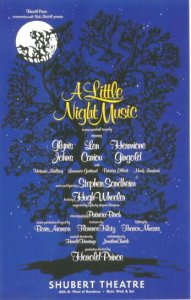
A Little Night Music is a musical with music and lyrics by Stephen Sondheim and book by Hugh Wheeler. Inspired by the 1955 Ingmar Bergman film Smiles of a Summer Night, it involves the romantic lives of several couples. Its title is a literal English translation of the German name for Mozart's Serenade No. 13, K. 525, Eine kleine Nachtmusik. The musical includes the popular song "Send In the Clowns", written for Glynis Johns.

Gerald Sheldon Herman was an American composer and lyricist, known for his work in Broadway theatre.

Dear World is a musical with a book by Jerome Lawrence and Robert E. Lee and music and lyrics by Jerry Herman. With its opening, Herman became the first composer-lyricist in history to have three productions running simultaneously on Broadway. It starred Angela Lansbury, who won the Tony Award for Best Leading Actress in a Musical in 1969 for her performance as the Countess Aurelia. It is not to be confused with "Dear World", the popular photo series where people write meaningful messages on their skin.
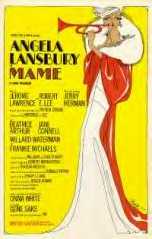
Mame is a musical with the book by Jerome Lawrence and Robert Edwin Lee and music and lyrics by Jerry Herman. Originally titled My Best Girl, it is based on the 1955 novel Auntie Mame by Patrick Dennis and the 1956 Broadway play by Lawrence and Lee. A period piece set in New York City and spanning the Great Depression and World War II, it focuses on eccentric bohemian Mame Dennis, whose famous motto is "Life is a banquet and most poor sons of bitches are starving to death." Her fabulous life with her wealthy friends is interrupted when the young son of her late brother arrives to live with her. They cope with the Depression in a series of adventures.
Showtune is a musical revue celebrating the words and music of Broadway composer and lyricist Jerry Herman. Its title was inspired by Herman's autobiography of the same name. The revue's original title was Tune the Grand Up. After its 1985 San Francisco premiere and several regional productions through the 1990s, the piece played in the West End in 1998 under the title The Best of Times, and Off-Broadway in 2003, titled Showtune.

Rose-Marie is an operetta-style musical with music by Rudolf Friml and Herbert Stothart, and book and lyrics by Otto Harbach and Oscar Hammerstein II. The story is set in the Canadian Rocky Mountains and concerns Rose-Marie La Flemme, a French Canadian girl who loves miner Jim Kenyon. When Jim falls under suspicion for murder, her brother Emile plans for Rose-Marie to marry Edward Hawley, a city man.

Mack & Mabel is a musical with a book by Michael Stewart and music and lyrics by Jerry Herman. The plot involves the tumultuous romantic relationship between Hollywood director Mack Sennett and Mabel Normand, who became one of his biggest stars. In a series of flashbacks, Sennett relates the glory days of Keystone Studios from 1911, when he discovered Normand and cast her in dozens of his early "two-reelers", through his creation of Sennett's Bathing Beauties and the Keystone Cops to Mabel's death from tuberculosis in 1930.
La Cage aux Folles is a musical with music and lyrics by Jerry Herman and a book by Harvey Fierstein.
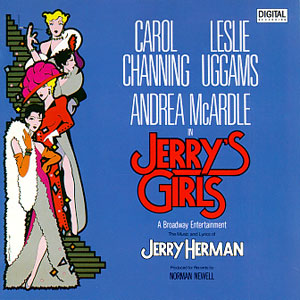
Jerry's Girls is a musical revue based on the songs of composer/lyricist Jerry Herman.

Fiorello! is a musical about New York City mayor Fiorello La Guardia, a reform Republican, which debuted on Broadway in 1959, and tells the story of how La Guardia took on the Tammany Hall political machine. The book is by Jerome Weidman and George Abbott, drawn substantially from the 1955 volume Life with Fiorello by Ernest Cuneo, with lyrics by Sheldon Harnick, and music by Jerry Bock. It won the three major theatre awards - Tony Award, the New York Drama Critics Circle award, and the Pulitzer Prize for Drama. It is one of only ten musicals to win the latter award.

Carnival is a musical, originally produced by David Merrick on Broadway in 1961, with the book by Michael Stewart and music and lyrics by Bob Merrill. The musical is based on the 1953 film Lili, which again was based on the short story and treatment titled "The Seven Souls of Clement O'Reilly" by Paul Gallico. The show's title originally used an exclamation point ; it was eventually dropped during the show's run, as director Gower Champion felt it gave the wrong impression, saying, "It's not a blockbuster. It's a gentle show."

Karen Morrow is an American singer and actress best known for her work in musical theater. Her honors include an Emmy Award and a Theatre World Award, and an Ovation Award and five Drama-Logue Award nominations.
Arthur Cantor was an accomplished American theatrical producer who contributed to the presentation of over 100 productions that were displayed on stages across the globe, including Broadway, Off-Broadway, London and Paris.
Marin Joy Mazzie was an American actress and singer known for her work in musical theatre.
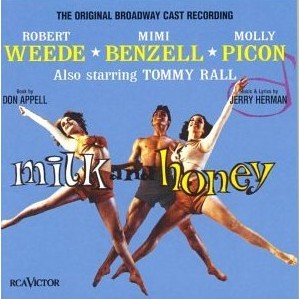
Milk and Honey is a musical with a book by Don Appell and music and lyrics by Jerry Herman. The story centers on a busload of lonely American widows hoping to catch husbands while touring Israel and is set against the backdrop of the country's struggle for recognition as an independent nation. It was Herman's first Broadway book musical following a succession of off-Broadway revues.
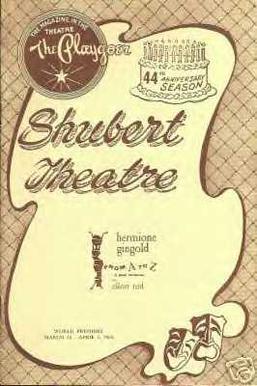
From A to Z is a musical revue with a book by Woody Allen, Herbert Farjeon, and Nina Warner Hook and songs by Jerry Herman, Fred Ebb, Mary Rodgers, Everett Sloane, Jay Thompson, Dickson Hughes, Jack Holmes, Paul Klein, Norman Martin, William Dyer, and Charles Zwar.
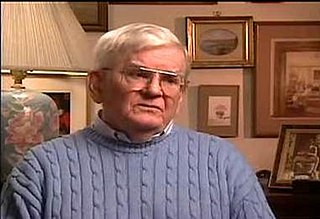
Tad Mosel was an American playwright and one of the leading dramatists of hour-long teleplay genre for live television during the 1950s. He received the 1961 Pulitzer Prize for Drama for his play All the Way Home.
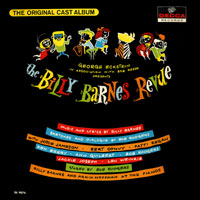
The Billy Barnes Revue is a 1959 musical comedy revue with music and lyrics by Billy Barnes and sketches by Bob Rodgers. The revue premiered in Los Angeles in 1959 and went on to be produced both on Broadway and Off Broadway.
All the Way Home is a play written by the American playwright Tad Mosel, adapted from the 1957 James Agee novel A Death in the Family. Each author received the Pulitzer Prize for their separate works.

Parade is a musical revue with book, music, and lyrics by Jerry Herman.
References
- 1 2 3 4 5 Herman, Jerry. Showtune: A Memoir. pp.59-61.
- 1 2 3 4 5 Funke, Lewis. "The Theatre: Aphrodite", New York Times, December 30, 1961.
- ↑ "The Lyons Den", Reading Eagle [Reading, Pennsylvania], December 29, 1960, p 8.
- ↑ "Project", New York Times, December 11, 1960.
- ↑ "Musical to break long run record", New York Times, February 4, 1961.
- ↑ "Mosel to honor his co-workers", New York Times, May 19, 1961.
- ↑ "New Musical", Village Voice, June 15, 1961, p 12.
- 1 2 "Madame Aphrodite", New York Times, October 16, 1961.
- ↑ Gaver, Jack. "Songwriter going places", Pittsburgh Press, December 24, 1961, p 6.
- ↑ "Notes in Brief", New York Times, November 18, 1961.
- ↑ "Theatrical Notes", New York Times, December 8, 1961.
- 1 2 3 Gaver, Jack. "Play 'Madame Aphrodite' becomes a mixed blessing", Palm Beach Daily News, January 21, 1962, p. 11.
- 1 2 3 4 5 Bloom, Ken. American Song: The Complete Musical Theatre Companion, pp.435-36
- ↑ Flint, Peter B. (1989-07-31). "Nancy Andrews, a Stage Actress, Singer and Comedian, Dies at 68". New York Times. p. B6. Retrieved 2010-01-31.
- ↑ BroadwayWorld. "John Rickard" . Retrieved 2010-01-31.